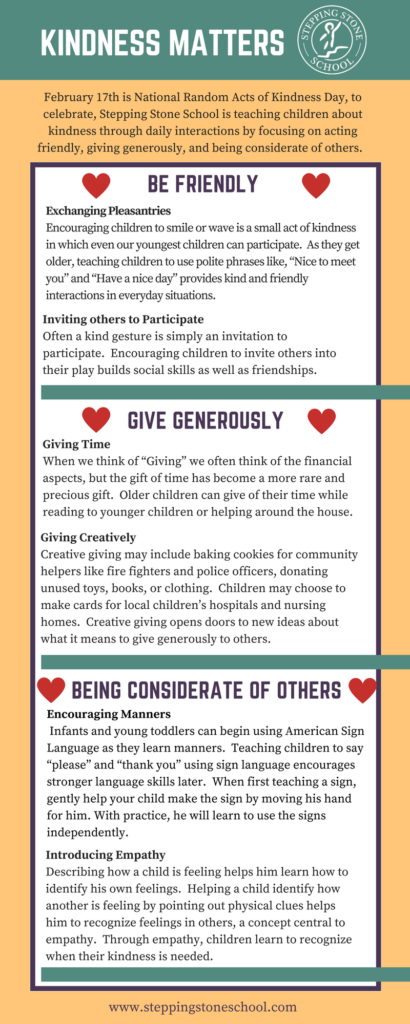Kindness Matters
February 17th is National Random Acts of Kindness Day, to celebrate, Stepping Stone School is teaching children about kindness through daily interactions by focusing on acting friendly, giving generously, and being considerate of others.

Acting Friendly
Exchanging Pleasantries
Encouraging children to smile or wave is a small act of kindness in which even our youngest children can participate. As they get older, teaching children to use polite phrases like, “Nice to meet you” and “Have a nice day” provides kind and friendly interactions in everyday situations.
Inviting others to Participate
Often a kind gesture is simply an invitation to participate. Encouraging children to invite others into their play builds social skills as well as friendships.
Giving Generously
Giving Time
When we think of “Giving” we often think of the financial aspects, but the gift of time has become a more rare and precious gift. Older children can give of their time while reading to younger children or helping around the house.
Giving Creatively
Creative giving may include baking cookies for community helpers like fire fighters and police officers, donating unused toys, books, or clothing. Children may choose to make cards for local children’s hospitals and nursing homes. Creative giving opens doors to new ideas about what it means to give generously to others.
Being Considerate of Others
Encouraging Manners
Infants and young toddlers can begin using American Sign Language as they learn manners. Teaching children to say “please” and “thank you” using sign language encourages stronger language skills later. When first teaching a sign, gently help your child make the sign by moving his hand for him. With practice, he will learn to use the signs independently.
Introducing Empathy
Describing how a child is feeling helps him learn how to identify his own feelings. Helping a child identify how another is feeling by pointing out physical clues helps him to recognize feelings in others, a concept central to empathy. Through empathy, children learn to recognize when their kindness is needed.
As children mature, their understanding of kindness will mature. In the near future they may very well surprise you in their demonstrations of random acts of kindness towards you.
